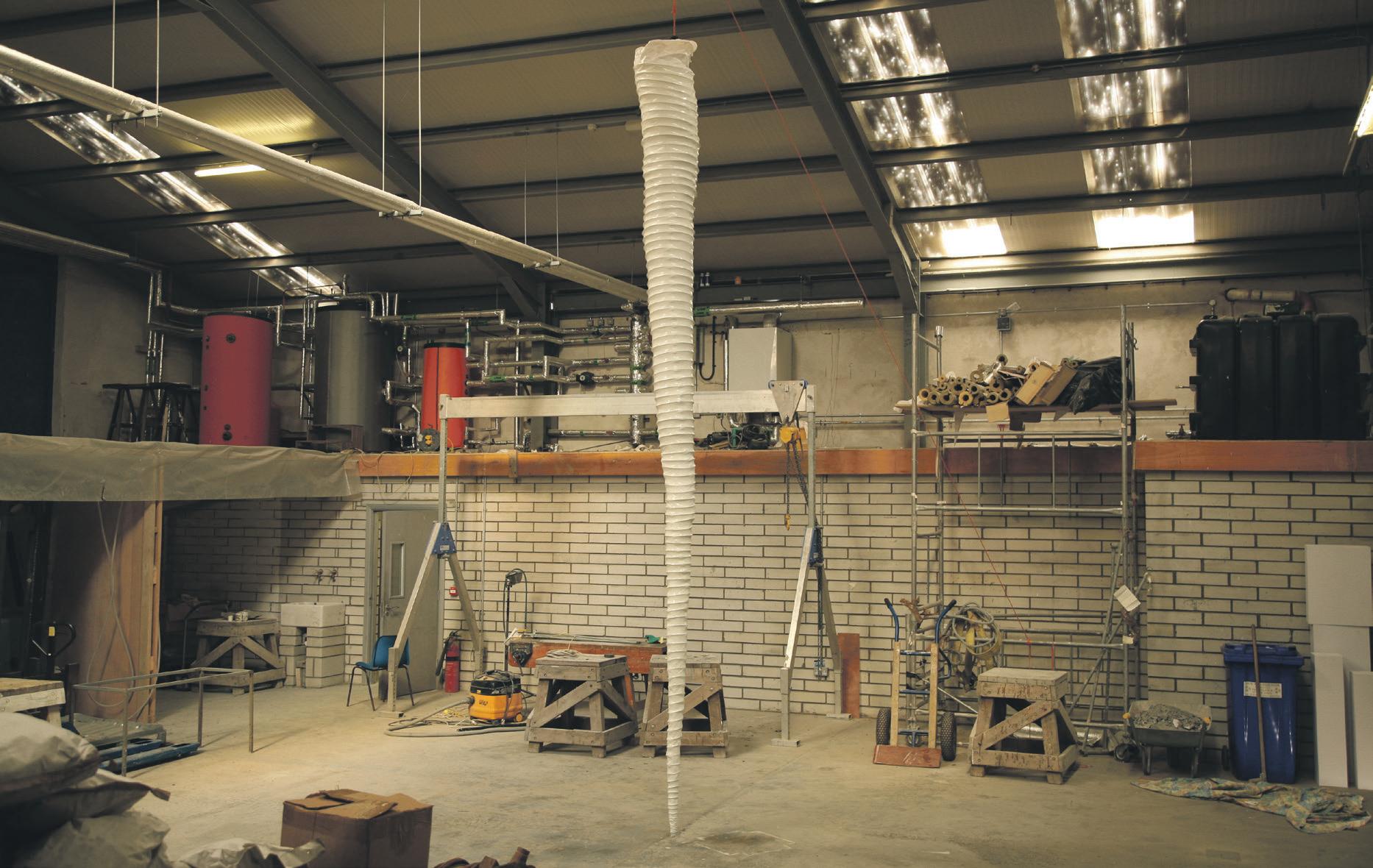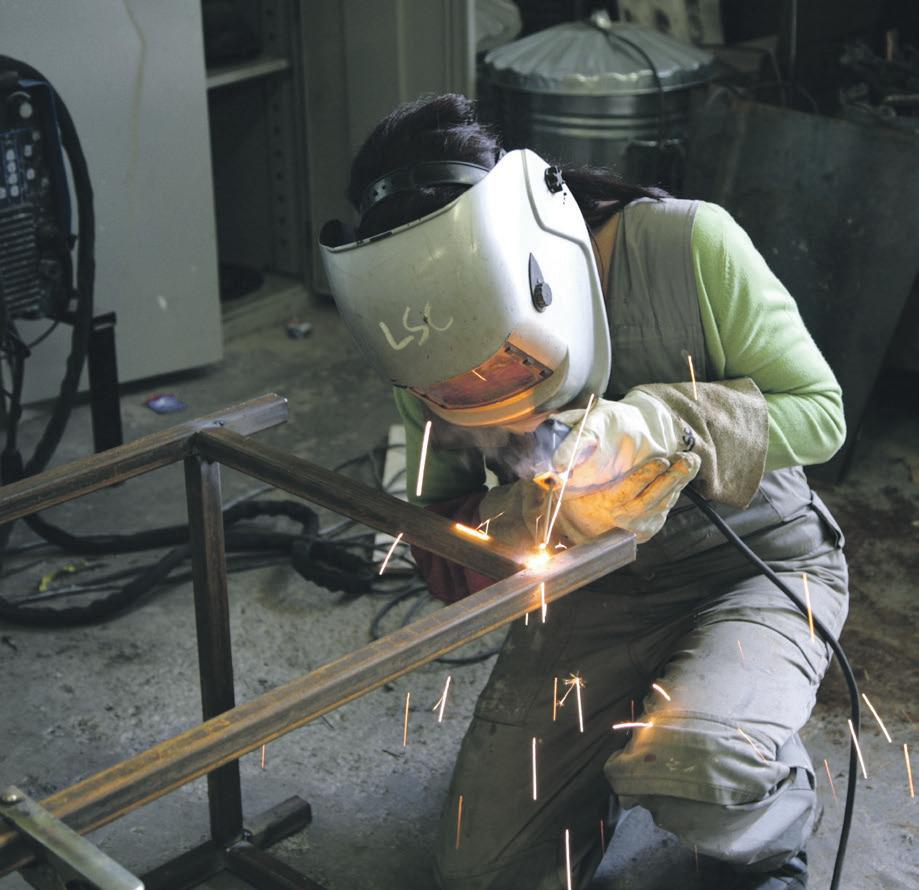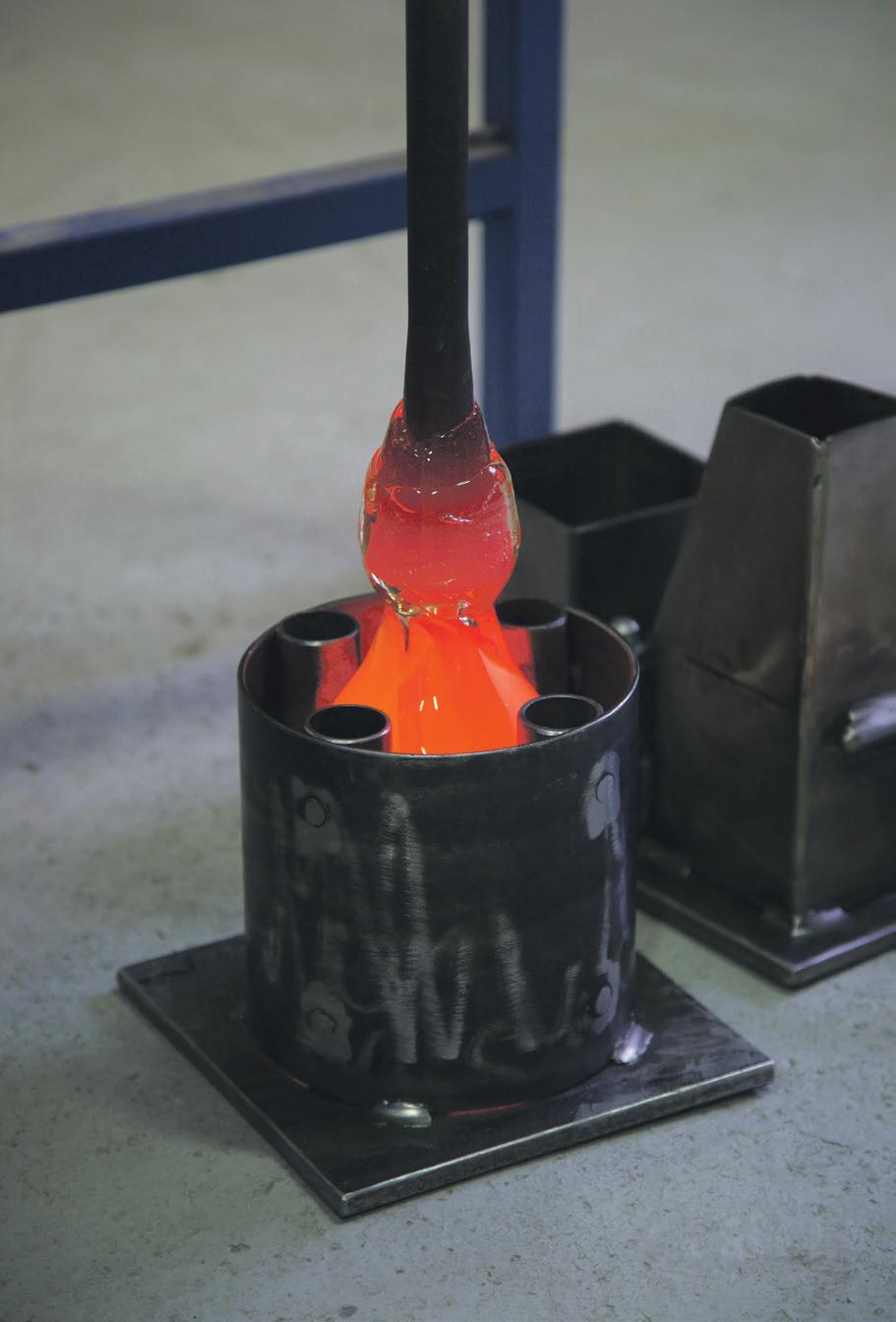
6 minute read
Material Processes. Seán O’Reilly provides an overview of the
Paddy Bloomer, Personal Deployable Crannog, LSC Residency, Glenade Lake, 2017; all images courtesy of Leitrim Sculpture Centre
Material Processes
SEÁN O’REILLY PROVIDES AN OVERVIEW OF THE FACILITIES AND PROGRAMME AT LEITRIM SCULPTURE CENTRE.
LEITRIM SCULPTURE CENTRE (LSC) is located in Manorhamilton, a rural market town in County Leitrim, at the confluence of five glacial valleys near the Northern Irish border. Established in 1997 as a charity supporting the practice and understanding of the fine arts in Ireland, LSC initially functioned for a few years as a FÁS training centre. Since 2005, it has achieved significant developments, both in the expansion of its spatial and technical infrastructure and in the diversity and vision of its artistic programme. Through my own leadership as director of LSC since 2005, and with the collaboration, support and advice of local artists and communities, I have sought to establish LSC as one of the country’s foremost resources for the advancement of contemporary visual arts, attracting both local, national and international practitioners.
One of the key markers in moving towards this vision was a major capital development programme (2007 – 2009) that enabled us to completely renovate and redesign LSC around nine new workshop areas dedicated to stone, ceramics, woodwork, metalwork, foundry, hot glass, mould-making, traditional print and photography. These material-based technical resources were further complimented by 21 studios for individual practitioners; three project spaces; a superb gallery; a community ‘pop-up’ on Main Street; as well as three residency studio-apartments and five private rooms for artists visiting the centre.
These technical resources were conceived as ‘open access’, in the sense that any creative practitioner within Ireland or abroad can easily obtain affordable resources for a day and up-to a month to develop their work. In the context of the increasing vulnerability of infrastructural supports to artists, both in Ireland and internationally, LSC has become strategically important in maintaining a comprehensive range of material-based technologies for visual arts practices in Ireland and especially in the North West.
One of the most important ways we support artists at all levels of experience is by providing the spatial and technical conditions for experimentation and risk in the development of new work. The demystification of technique is achieved through workshops that cater for both basic and intermediary levels of experience. Masterclasses bring professional artists together to explore advanced practice around a specific medium or process through the sharing of knowledge and skills. Technical support is offered throughout, ranging from oneto-one work with artists wishing to advance a new technique or operate specialist equipment, to more in-depth support, where specialists are enlisted to address a specific process.
Another major development in 2009 was the LSC Gallery, where the continuation of the creative process extends to experimentation with new forms of arrangement, display and communication. Full-time technical and curatorial support is available to all artists installing exhibitions and site-specific projects. Complimenting the gallery, a current development is the LSC Community Pop-Up space on Main Street in the centre of town, offering scope for artists to test out new configurations of their work in a public context. It also offers opportunities for a wide variety of community initiatives and social exchanges that in many instances integrate with the region’s local culture and interests, whilst also encouraging the active participation of different publics in projects that advance the creative capacity of participants.
ARTIST RESIDENCIES If one had to pin down where all these supports best culminate, or where LSC truly excels, it would have to be the Artists Residency Programme. Residencies are the most effective and dynamic ways that we support artists at various stages of their creative cycles and careers. Residencies also provide the inspirational force for many of LSC’s other programming strands, feeding into research and conceptualisation; creation and experimental development; community engagement, collaboration and contextual practice; exhibitions, documentation and archiving. They also reinforce our function as a resource organisation, as each residency comes with a studio-apartment with generous access to additional space and technical facilities. We currently have three separate residency strands that provide up to 12 residencies per year:
Aideen Barry, Work in Progress, LSC, 2010

‘Technical Development Residencies’ (TDRs) focus on advancing creative and practical engagement within specific technical areas chosen by the artist. Residencies are for four weeks and include an artist’s fee of €1,500 with free access to technical resources and support. Each year, we provide up to four TDRs through an open call, however artists may also choose to organise and fund their own TDRs and can contact LSC for guidelines on how to do this. ‘Professional Development Research Residencies’ (PDRs) offer an exploratory research base for artists, curators and writers who need time out to speculate on new work, ideas and/or collaborations in a rural context and/or in relation to specific material processes without the requirement of an exhibition or any specific outcome at the end. Residencies number up to four per year and last for six weeks including an artist’s fee of €1,500 and access to technical and archival resources and curatorial support. ‘Exhibition: Context and Collaboration Residencies’ (ECRs) support site-specific modes of collaboration with the landscape, place and communities of North Leitrim. This residency involves the development of new collaborative practices leading directly to public exhibition, display, and involvement in the gallery. There are five residencies per year, each lasting eight weeks, with an artist’s fee of €2,000 and material allowance of €500.
COLLABORATION IN THE RURAL CONTEXT Context and Collaboration Residencies also serve to shift the overall emphasis in LSC from the technical development of new work (based on traditional sculptural media), towards a more social engagement with the surrounding region. Critical considerations of landscape, place and the rural figure highly in an expanded practice that enlists the active participation of a multitude of social actors including: human participants, materials, objects, plants, animals, histories, heritage sites, physical spaces and structures, forces of nature, as
Technical Support in Stone carving, LSC, 2017
well as everyday practices, cultural representations and public issues of concern. It is from these socially entangled spaces that site-specific modes of co-operative action are researched, developed and activated and where potential involvement from local communities, schools, businesses, as well as different sectors of the town (such as heritage and tourism) are developed. Outcomes may appear in the gallery or onsite and address a range of issues such as land use, climate change, biodiversity, environmental stress or propose positive and sustainable models of practice and dwelling in the rural context; in the fields of agriculture, the economy, the built environment and cultural diversity. Such projects may also strive to examine these aspects within a global dimension and, where possible, relate to issues of national and international import.
Leitrim Sculpture Centre has come a long way since I arrived in 2005 and this would not have been possible without the encouragement, critical insights and financial support of the Arts Council, Leitrim County Council and the Department of Culture, Heritage and the Gaeltacht, not forgetting the immense support provided by LSC staff and especially local artists, communities and businesses. We thank them all for working with us and look forward to continuing the development of LSC as a significant resource for the advancement of contemporary visual arts practice, both in Ireland and beyond.

Welding Workshop, LSC, 2018












